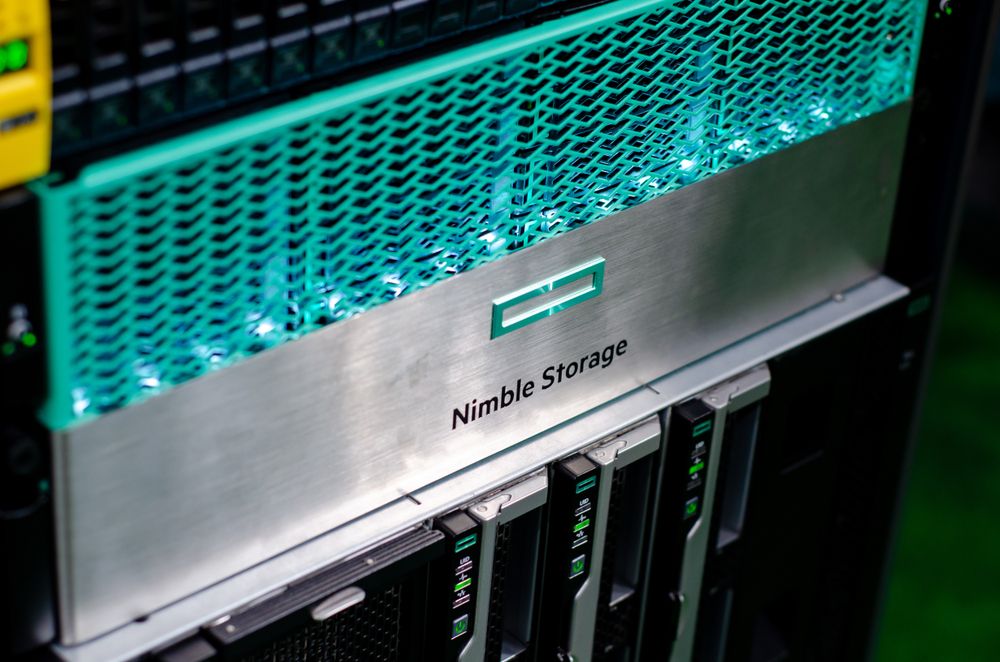How to Choose the Perfect Data Storage Solution for Your Enterprise’s Needs
IT pros must recognize their need for more robust data storage to remain competitive in an increasingly data-dense future. Future-proof your...

Siloed IT infrastructures are no longer cutting it. It’s time to turn to more advanced storage solutions. Learn more.
Storage is changing — and it’s changing fast. Ten years ago, siloed IT infrastructures were the norm. If you asked an enterprise what their infrastructure looked like, they would have likely said they had a team in charge of managing networking, one that handled server-hosted compute functions, and another that dealt with storage.
However, since then, data production has boomed, devices have become more advanced, and enterprises need more bandwidth than ever (especially with the rise of edge computing and Internet of Things devices). With all these advances, traditional storage solutions have struggled to keep up.
The good news is that there are new, more powerful storage solutions that can keep enterprises’ data available and secure, from storage arrays, to hyper-converged infrastructure (HCI), to as-a-service options. If you aren’t sure where to start finding solutions that can meet today’s (and tomorrow’s) data storage demands, this guide is a great place to start. We’ll go over Nimble Storage Arrays, Nimble dHCI, and other top storage solutions so you can determine which option is best for your organization.
A market leader in the storage space, the Nimble Storage product line was founded in 2008 and quickly grew before being acquired by Hewlett Packard Enterprise (HPE) in 2017 for $1.09 billion. Today, there are three types of Nimble Storage solutions: all-flash, adaptive flash, and disaggregated HCI (dHCI).
Each Nimble Storage solution works slightly differently, but all three run on the HPE NimbleOS operating system, support triple parity, provide high-speed storage, and offer efficient data reduction and unprecedented reliability. The NimbleOS operating system also provides data deduplication and compression, saving storage space, improving performance, and reducing unnecessary writes, power consumption, and cooling charges.
Since these storage solutions support HPE Cloud Volumes, enterprises can also easily move data between on-premises and cloud storage resources or among various cloud providers. Plus, with all-inclusive licensing, fast implementation, and the ability to easily combine arrays or add shelves and drives, Nimble storage solutions are flexible and scalable, allowing your enterprise to remain agile no matter its size.
It’s also worth noting that Nimble Storage solutions easily integrate with HPE InfoSight, an artificial intelligence-based system that can monitor the arrays, collect and analyze data from HPE Nimble devices, and use predictive analytics to identify problems before they occur. This results in 99.9999% guaranteed data availability. Plus, with HPE InfoSight automatically 86% of issues are automatically resolved. That means you won’t have to worry about compromised performance or unplanned downtime and will have more time to focus on what really matters.
In a nutshell, Nimble storage solutions provide high performance, flexibility, scalability, Veeam integration, cloud integration, and more, all while offering 79% lower storage expenses. Given all that, it’s hardly surprising that HPE earned a top spot in Gartner’s Magic Quadrant for solid-state arrays for many years and a 2018 Storage Product of the Year by TechTarget for its Nimble Storage all-flash and hybrid SAN arrays. Mid-sized enterprises, departments within larger companies, and newcomers to the storage array market can all enjoy simple, reliable storage and cloud integration with HPE Nimble Storage solutions.
Nimble dHCI is a hyper-converged infrastructure solution. With HCI, enterprises can say goodbye to the expensive, purpose-built hardware and separate storage arrays, storage networks, and servers required in traditional infrastructure systems. Instead they can say hello to a unified, software-defined system that’s safe, simple to use, and which tightly integrates storage, compute, networking, and virtualization resources into a single system.
While it’s true that most HCIs require three fully-provisioned virtual servers (also called “nodes”) to function, they can be controlled via a single platform and a hypervisor, making the management process much easier. In addition to a more streamlined management experience, enterprise IT teams can enjoy a lower cost of ownership with HCI. Additionally, the storage pool is very flexible compared to a traditional infrastructure and IT admins can quickly shift workloads without configuring a new server or checking for software compatibility.
HPE Nimble Storage dHCI offers the best of both converged and hyper-converged architectures. Like HCI, dHCI is a simple and easy-to-use storage solution. However, it also allows for the independent scaling of compute and storage without sacrificing the speed and resiliency associated with traditional HCIs. So, while enterprises may find themselves overprovisioning with a traditional HCI, they can get the right amount of compute and storage without wasting any resources when they use dHCI. In fact, many reduce storage costs by 33-50% when they shift from HCI to dHCI and eliminate overprovisioning altogether.
Another advantage of dHCI is that it reduces the chances of an organization fully losing data because there’s no single point of failure. That’s particularly valuable seeing as 50% of organizations have suffered an unrecoverable data loss in recent years. Additionally, dCHI offers built-in data protection, application-level encryption, continuous wellness monitoring, and compatibility with HPE InfoSight, which provides predictive analytics that can diagnose and resolve level 1 and level 2 issues automatically.
And the advantages don’t end there. HPE’s dHCI takes a data-first approach that can streamline enterprises’ infrastructures while still being easy to configure. In less than 15 minutes, your enterprise will be ready to go with dHCI. It’s also highly scalable, so it can support your enterprise’s needs, no matter how big you grow in the coming years.
dHCI also offers ten times lower latency, delivering sub-millisecond latency at scale, advanced data reduction, and 99.9999% guaranteed availability, putting it head and shoulders above traditional HCI solutions regarding performance and resiliency. Even if three drives fail simultaneously, enterprises won’t notice a difference in performance.
Plus, dHCI is covered by the HPE Store More Guarantee, so you can trust that you’re getting maximum resource efficiency. Even better, data storage is automatically optimized with dHCI, so you don’t have to continuously finetune the balance between capacity and performance as you might with HCI.
If you want all the benefits of HPE dHCI but would prefer to get it as a cloud service, HPE GreenLake might be a good fit for you. With HPE GreenLake, your enterprise can enjoy the agility and resiliency of dHCI along with simplified IT management and accelerated time to value. HPE GreenLake offers various ready-to-ship configurations, so you can get the industry-leading storage you need quickly. Plus, since it’s an as-a-service offering, you can pay for exactly what you need and nothing you don’t.
Alternatively, if you’re looking for a more powerful hyper-converged solution, you should consider HPE’s SimpliVity. This platform will converge your entire IT stack in each node, making it a great option if you plan to scale up in the future. With automated storage utilization, always-on compression, built-in backup and disaster recovery, enterprise-level data protection, guaranteed data efficiency, and policy-based VM-centric management, SimpliVity is an efficient, reliable solution for enterprises.
There are plenty of storage solutions on the market today, from pure cloud solutions, to traditional on-premises solutions, to converged solutions. No matter what kind of storage you’re looking for, the Nimble storage array options — including Nimble dHCI — have you covered.
At Turn-key Technologies, Inc. (TTI), we are well-versed when it comes to enterprise storage. With more than 30 years of experience on the cutting edge of the technology and cybersecurity space, we have the know-how to help you find the best storage solution for your organization. We can even help implement and manage your enterprise’s storage.
Contact us today to find out more about how HCI can help transform your enterprise storage for the better.

IT pros must recognize their need for more robust data storage to remain competitive in an increasingly data-dense future. Future-proof your...

The E-rate program has helped countless K-12 schools afford telecommunications services and Internet access. However, there are still a few necessary...

As hyper-converged IT infrastructures become increasingly mainstream, enterprises must brush up on the approach lest they fall behind industry...